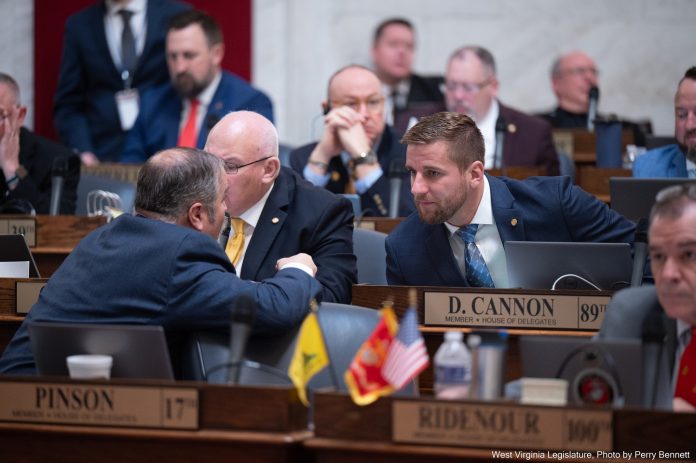House Bill 2491 expands the definition of “charitable or public service activity or endeavor” to allow colleges and universities to hold online raffles. The school must be NCAA Division I or Division II to be eligible. The proceeds from the raffles must benefit the athletic department, including all affiliated and associated nonprofit corporations or other entities, trusts, or Name Image Likeness (NIL) collectives, and must be spent within one year unless an extension is granted.
House Bill 2499 requires that public school principals and county board members receive an in-person informational training course covering the federal law on the Individuals with Disability Education Act, the Least Restrictive Environment, updated discipline guidance from the United States Department of Education, and parental rights regarding due process.
House Bill 2511 allows charitable bingo and alcohol sales and consumption to take place simultaneously for Fraternal Beneficiary Societies, Domestic fraternal societies, Veteran’s organizations, and Volunteer fire departments.
House Bill 2513 enhances training for county board of education members by increasing the number of training hours to 12, setting a training deadline, and updating the training material to include fiscal management and IDEA. County board members can attend additional training if approved by the State Superintendent.
House Bill 2516 repeals antiquated and inoperative sections of the education code, including Vision 2020, provisions related to Cedar Lakes, which is now within the Department of Agriculture, college and career readiness, statewide textbooks, and instructional material – now handled at the county level, School Innovation Zone Act, and obsolete language relating to vo-tech education.
House Bill 2528 allows athletic teams in nonpublic schools that have played at least two public schools during the regular season to be eligible to participate in county tournaments at the end of the season.
House Bill 2548 requires the State Superintendent to report annually to the Legislative Oversight Commission on Education Accountability on implementing state board rules in each county school district. If a county school board violates the rules, the State Superintendent will provide an implementation plan. School aid funding can be withheld if the county continues to violate the rules.
House Bill 2575 requires the Department of Health to employ a full-time dementia service director. The director must coordinate the implementation of the State Alzheimer’s Disease and Other Dementia Plan, evaluate dementia services available in the state, identify duplicative services and grant opportunities, promote dementia awareness, collect data, and compile reports.
House Bill 2576, the NIL Act, protects rights, responsibilities, authorities, and limitations relating to the name, image, and likeness of an individual who participates as a student-athlete in an institution of higher education. The bill puts guardrails in to protect institutions and students. Student-athletes can be compensated for using their name, image, or likeness. The bill does prohibit student-athletes from endorsing certain items.
House Bill 2595, the Nonprofit Athletics Act, allows for higher education institutions to enter a contract with a private corporation for operational, economic, fiscal, and educational development activities. The nonprofit would be controlled by a board that primarily does administrative work and assists with students contracting with other businesses for sponsorships.
House Bill 2678 allows private schools to request a Division of Highways designation of a school zone.
House Bill 2695 allows Raleigh County to levy a special district excise tax to benefit the Raleigh County Economic Opportunity Development District. A developer will come in and do a master development plan. A CPA will make financial projections on what sales taxes will be. Then, the sales taxes will stay in the district to pay off bonds. It’s a way to incentivize developers to come into the area. There is no fiscal note; the bill asks the state to allow the county to use the taxes collected in the district. The model would be based on The Highlands in Ohio County.
House Bill 2709 allows a voter with a change of address within the same county to vote in their new precinct without having to cast a provisional ballot. The bill provides that the vote must be cast during the early, in-person voting period, and the voter must show proof of a new address. The county clerk must complete the change of address in the statewide voter registration system before canvassing.
House Bill 2711 repeals the common law rule against perpetuities by prospectively extending its application to all trusts to 1,000 years and modernizing West Virginia trust law.
House Bill 2718 creates the State Advisory Council on Establishing a Military College to study the viability and potential benefits of creating a four-year college in West Virginia modeled after one of the six senior military colleges.
House Bill 2742 removes obsolete language and creates a certificate of public necessity waiver for projects reviewed and approved by the Infrastructure and Jobs Development Council.
House Bill 2752 allows motorcyclists to stand when needed while riding a motorcycle.
House Bill 2755 requires the Board of Education to submit all legislative rules to LOCEA and the Legislative for review, approval, amendment, or rejection.
House Bill 2761 increases the jurisdiction limits of magistrate courts for claims less than or equal to $20,000.00 and clarifies that corporate parties may appear pro se by an agent or by an attorney, provided the corporate party is attempting to vindicate its claims rather than those of a third party.
House Bill 2773 approves rules proposed by the Higher Education Policy Commission regarding the Accountability System, the Underwood-Smith Teaching Scholars, and the Teacher Loan Repayment Program. The bill also authorizes a rule proposed by the Council for Community and Technical College Education regarding Employing and Evaluating Presidents.
House Bill 2797 expands the number of professionals who may diagnose post-traumatic stress disorder as a compensable injury or disease under workers’ compensation. The bill allows licensed psychiatrists or psychologists, as well as certified mental health nurse practitioners, who have a master’s degree or higher or hold a terminal license in their profession.

